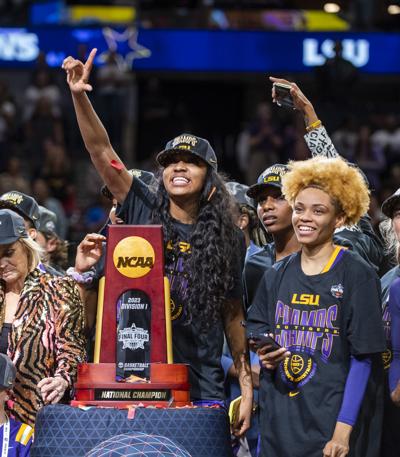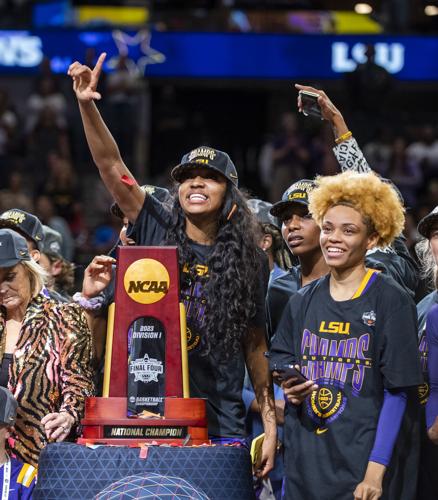I don't know Angel Reese.
I don't know Caitlin Clark.
But I've seen people like them plenty of times.
Reese, a member of the NCAA women's basketball national champion LSU Tigers, helped beat Clark and the Iowa Hawkeyes 102-85 Sunday.
During the Final Four tournament, both Reese and Clark played outstanding basketball. Both also did something similar to express their competitive drive — but only Reese got called out for it after Sunday's showdown against Clark.
Is it a matter of Black and White?
In a word, yes.
Nearly all of us have seen great competitors like Reese and Clark.
If you follow sports on any level, you know who the fiercest ones are. They're typically not the players sitting on the bench waiting quietly for a chance to get in the game. They're not even most of those in the starting lineup.
They are the players with some of — if not THE — loudest voices and most attention-grabbing behavior, much of it designed to inspire their teammates and rattle their opponents.
Many outstanding athletes, including Reese and Clark, employ such tactics — gesturing, joking, even trash-talking to push the buttons of their adversaries.
Near the end of Sunday's championship game, with LSU comfortably ahead, Reese waved her hand in front of her face as she strode near Clark, a gesture universally understood to say, "You can't see me," as popularized years ago by wrestler-turned-actor John Cena.
Not only was it a nonoffensive gesture when used by Reese, it mimicked the exact same gesture Clark had used only days earlier, in Iowa's epic Elite Eight win over Louisville.
No one expressed any disapproval of Clark for her use of the gesture, but network commentators, reporters, spectators and fans immediately called Reese "classless," "idiot" and worse when she used it.
The controversy that ensued had been brewing for some time, but it erupted during the Women's Final Four. It started when Iowa coach Lisa Bluder repeated another coach's comment that going against the hard-driving South Carolina women was like "going to a bar fight."
South Carolina coach Dawn Staley rightly took offense to such comments. So did Reese, who felt the moment for herself, for her team, for Black girls like her — and for another team with Black women like her. She stood up for her conference sisters on South Carolina's mostly black team.
Reese said after Sunday's game she didn't appreciate Clark or her coach disrespecting the South Carolina Gamecocks. She said Clark also disrespected LSU guard Alexis Morris.
That, in fact, is what motivated Reese to give some payback to Clark via Cena's hallmark "You can't see me" hand wave — and to point to her own ring finger in front of Clark the same way that fellow LSU legend Joe Burrow did to the crowd when the football Tigers won the national championship against Clemson in 2020. No one criticized Burrow for it.
Unfortunately, what should've been a beautiful night for Reese turned ugly in every form of media — all in the time it took her to walk from the Tigers' locker room celebration to the postgame media podium.
To her credit, a composed Reese gave the moment the context it deserved — context her critics needed to hear.
"I don't fit in the box that you all want me to be in. I'm too hood, I'm too ghetto. You told me that all year. But when other people do it, y'all don't say nothing," Reese said. "So this is for the girls that look like me, that want to speak up on what they believe in. It's unapologetically you."
It's not unusual for hyped athletes to get into each others' heads. What's unfortunate is how too many respond to the same actions quite differently.
LSU women's coach Kim Mulkey knew how to respond. After Sunday's game, she told Iowa's Clark, "You're a generational player." Clark dominated her opponents throughout the season and through the NCAA tournament. She scored 30 points against LSU Sunday night.
Yes, Caitlin Clark is a generational player.
So is Angel Reese.
So don't dis Reese based on her skin color or fashion choices when she owns her greatness. Think about all the Black girls who want to be — and someday can be — just like her.



















